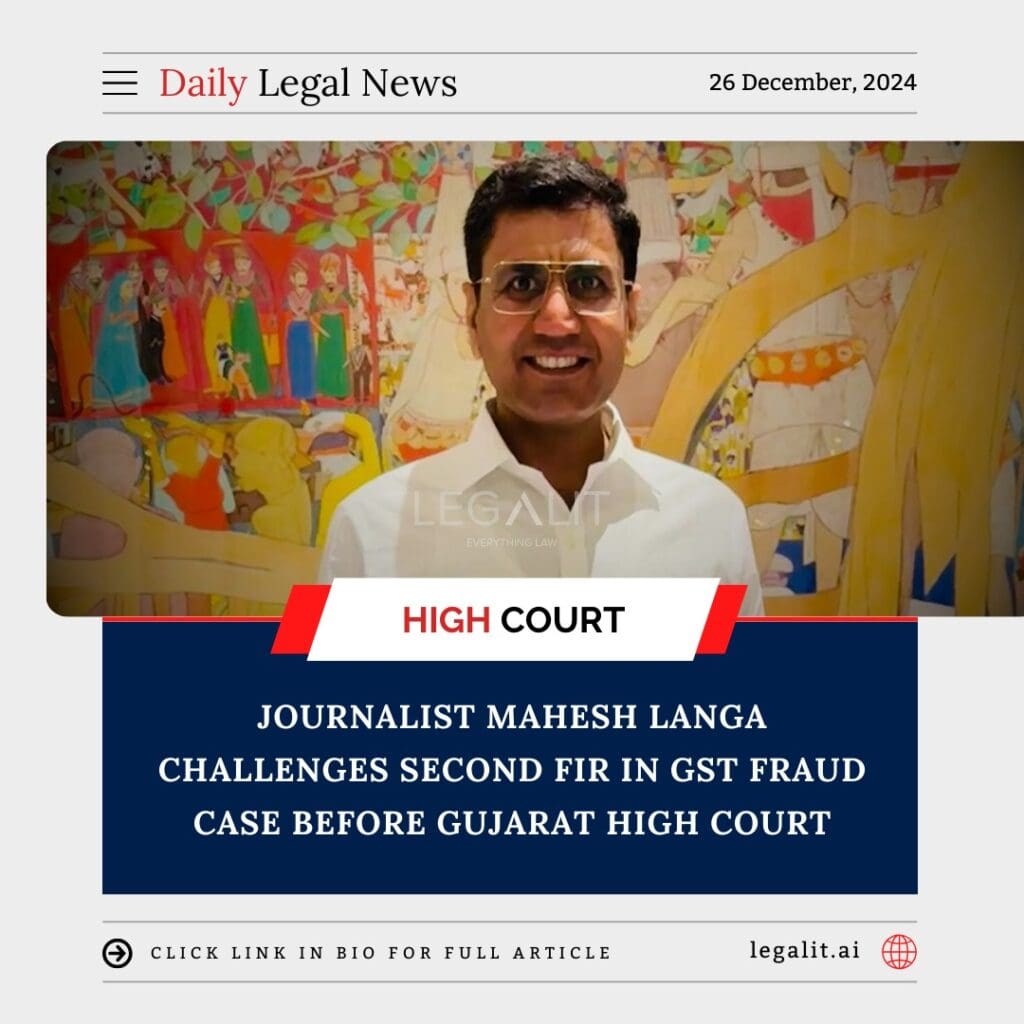
Journalist Mahesh Langa has moved the Gujarat High Court challenging the registration of a second First Information Report (FIR) against him in a Goods and Services Tax (GST) fraud case. The journalist contends that the new FIR is an attempt to harass him and is based on an unfounded claim, with no legal or factual basis. The matter has drawn attention as it raises significant questions about the misuse of legal provisions against media professionals and the broader implications for press freedom in India.
Background
Mahesh Langa, a prominent journalist known for his investigative reporting, has been accused in a GST fraud case involving alleged tax evasion and financial irregularities. Initially, an FIR was filed against him by the Goods and Services Tax department in connection with these allegations. However, the issue gained further complexity when a second FIR was registered against him on the same set of allegations.
Langa argues that the second FIR, which was filed without fresh evidence, is an attempt to silence him and stifle his journalistic work. He contends that the legal move against him is retaliatory in nature, especially given his investigative work that has brought attention to sensitive issues. The journalist has sought the Gujarat High Court’s intervention, asking it to quash the second FIR, claiming that it violates the principles of double jeopardy and constitutes an abuse of the legal process.
The challenge has sparked discussions about the increasing use of legal mechanisms to target journalists and the potential chilling effect on press freedom in the country.
Key Arguments
Langa’s Defense
- Double Jeopardy: Langa’s legal team argues that filing a second FIR based on the same set of facts violates the constitutional protection against double jeopardy, which prevents an individual from being prosecuted twice for the same offense.
- Harassment of Press Freedom: Langa claims that the second FIR is an attempt to intimidate him and suppress his work as a journalist. He maintains that the move is a clear example of how legal provisions can be misused to target journalists for their reporting.
- No New Evidence: His defense highlights that no new evidence has surfaced that justifies the registration of the second FIR. The allegations are identical to those in the first FIR, suggesting that the action is unnecessary and vindictive.
Government’s Position
- Procedural Legitimacy: The state and the GST department may argue that the second FIR was filed in accordance with the law and following due process. They could claim that the new FIR is part of an ongoing investigation where new facts have come to light, necessitating further action.
- Focus on Legal Accountability: The government may also argue that the registration of the FIR was a necessary step to ensure legal accountability for the alleged GST fraud. They could assert that the case should proceed as per the legal provisions without interference.
Court’s Observations and Ruling
The Gujarat High Court, after hearing the arguments from both sides, will decide whether the second FIR against Mahesh Langa is justifiable or whether it constitutes an abuse of the judicial process. The court may examine whether the principles of double jeopardy apply in this case, and whether the registration of the second FIR is an appropriate legal action or an attempt to target the journalist for his work.
- Stay on Proceedings: In some instances, the court may issue a stay on the proceedings of the second FIR until a final ruling is made.
- Legal Precedent on Journalistic Freedom: The court’s ruling could have broader implications for the protection of journalists’ rights in India, especially in cases where the media’s role in exposing wrongdoing or government actions may attract legal challenges.
Legal and Policy Implications
Protection of Press Freedom
The case highlights the growing concerns over the use of legal instruments to target journalists. The outcome may influence the approach taken by courts in safeguarding press freedom and ensuring that journalists are not subjected to undue legal pressures or retaliatory actions for their work.
Double Jeopardy and Constitutional Protections
The case may also set a precedent regarding the application of the double jeopardy principle in India. Courts could further clarify the extent to which the protection against multiple prosecutions for the same offense can be applied, particularly in cases involving allegations of fraud or financial wrongdoing.
Impact on Investigative Journalism
A ruling in favor of Langa may encourage investigative journalists by reinforcing their legal protection against attempts to stifle their reporting. On the other hand, a decision in favor of the second FIR could embolden legal actions against media personnel and possibly intimidate those seeking to report on corruption or misconduct.
Conclusion
Mahesh Langa’s challenge to the second FIR in the GST fraud case before the Gujarat High Court brings into focus important issues related to press freedom, legal accountability, and the protection of journalists. The case serves as a reminder of the need to strike a balance between enforcing legal provisions and safeguarding fundamental rights, including the right to freedom of expression. The court’s decision in this matter could set a critical legal precedent for how the justice system handles cases involving media professionals and the misuse of legal mechanisms against them.